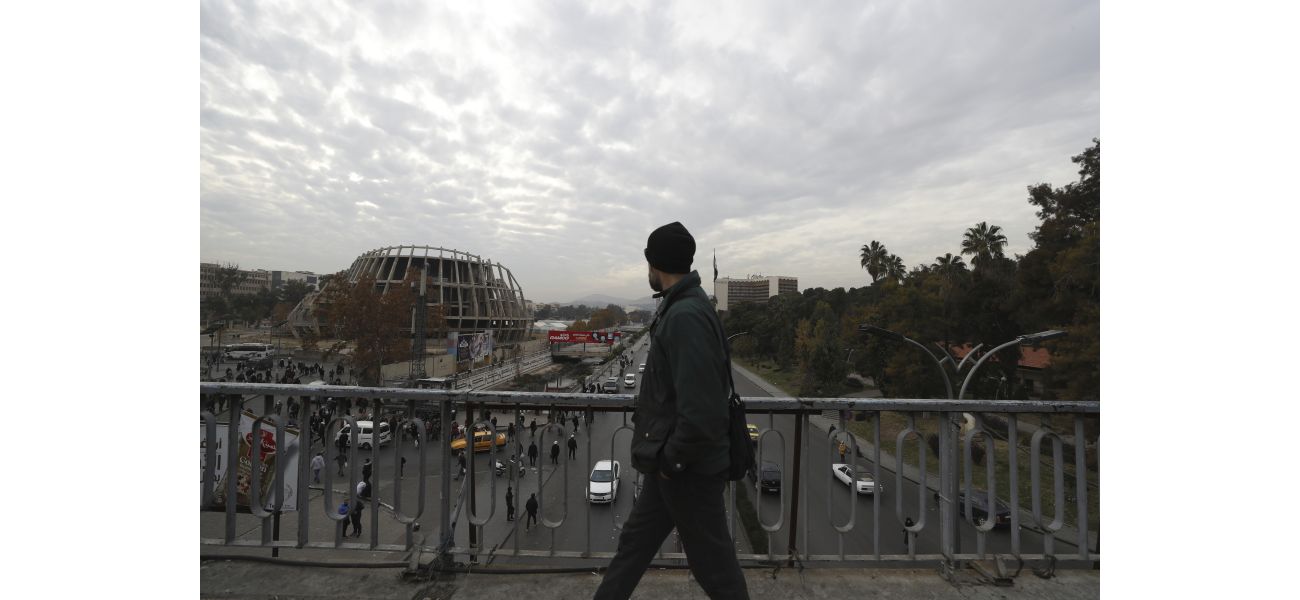Syrian rebels reportedly in Damascus, gunfire heard by residents.
Damascus airport was cleared and flights stopped, according to pro-government radio Sham FM.
December 8th 2024.

Early on Sunday, Syrian rebels made the bold claim that they had entered the capital city of Damascus, marking a significant advancement in their campaign across the country. Residents of the city reported hearing gunfire and explosions, but there was no immediate statement from the Syrian government regarding the situation.
According to reports from the pro-government Sham FM radio station, the Damascus airport was evacuated and all flights were halted. This news came as a shock to many, as just the night before, opposition forces had taken control of the central city of Homs. This was a major blow to the government, as Homs serves as an important link between Damascus and the coastal provinces of Latakia and Tartus, where Assad's base of support and a Russian naval base are located.
There were rumors circulating that President Bashar Assad had fled the country, but the government denied these claims. The loss of Homs was a significant setback for Assad and his forces, and it was clear that the rebel forces were gaining momentum in their fight against the government.
The rebels continued their push towards Damascus, announcing that they had also taken control of the notorious Saydnaya military prison and freed the prisoners held there. This news was met with both shock and hope by the Syrian people, who have been living under the shadow of Assad's regime for years.
As the rebels made their way closer to the capital, the Syrian army withdrew from much of the southern part of the country, leaving many areas under the control of the opposition fighters. This included several provincial capitals, further weakening the government's control.
If the rebels were able to take control of Damascus, it would be a significant blow to the government, as they would only have control of two out of fourteen provincial capitals. This rapid advancement by the opposition, led by the Hayat Tahrir al-Sham group, was a cause for concern for Assad's allies and the international community.
The lack of resistance from the Syrian army, coupled with the withdrawal of support from Assad's allies, posed a serious threat to his rule. The UN's special envoy for Syria, Geir Pedersen, called for urgent talks in Geneva to ensure a peaceful political transition. Meanwhile, Russian Foreign Minister Sergey Lavrov expressed his sympathy for the Syrian people and the rapidly changing situation in the country.
In Damascus, people rushed to stock up on supplies and many attempted to leave the country through the border with Lebanon. The situation was tense, with shops closed and those that were open selling essential items at triple the normal price. People were worried about the possibility of a battle in the city and were unsure of what the future held.
This was the first time since 2018 that opposition forces had reached the outskirts of Damascus, when the Syrian army recaptured the area after a long siege. As a precaution, the UN announced that noncritical staff would be moved out of the country. However, the Syrian state media denied rumors that Assad had left the country and asserted that he was still performing his duties in Damascus.
The rebel forces' swift advancements and the lack of support for Assad's regime were causing a major shift in the Syrian conflict. It was a critical moment for the country, and the outcome of this battle would determine the future of Syria and its people.
Early on Sunday, Syrian rebels made a bold announcement - they had successfully entered the city of Damascus, marking a significant advancement in their movement across the country. As gunfire and explosions echoed throughout the capital, there was no immediate response from the Syrian government. Reports from the pro-government Sham FM radio station claimed that the airport had been evacuated and all flights were halted.
In addition to taking control of Damascus, the insurgents declared that they had also liberated the notorious Saydnaya military prison, located just north of the city. This triumph followed their capture of Homs, Syria's third-largest city, the night before. As government forces retreated, opposition fighters quickly took over Homs, causing panic among the regime. Despite rumors that President Bashar Assad had fled the country, the government denied these claims, determined to maintain their control.
The loss of Homs was a major setback for Assad and his regime. The city holds strategic importance, serving as a vital link between Damascus and the coastal provinces of Latakia and Tartus - areas that have been a stronghold for the Syrian leader and home to a Russian naval base. Though the Sham FM radio station reported that government forces had taken positions outside of Homs, it was clear that the rebels were the ones in control.
According to Rami Abdurrahman, head of the Syrian Observatory for Human Rights, Syrian troops and security agencies had withdrawn from the city, allowing the rebels to enter and claim parts of it. This success was announced by the insurgency later that Saturday, solidifying their control over Homs and sending a clear message to the regime - their power and influence were growing.
The rebels' recent military victories, including the capture of Aleppo, Hama, and large parts of the south, have been a game-changer in the ongoing conflict. Analysts predict that their control of Homs will have significant consequences for the future of Syria. As the Syrian army withdrew from the southern part of the country, more areas fell under the control of opposition fighters, with some even capturing provincial capitals.
If Damascus were to fall to the rebels, the government would only have control over two of the 14 provincial capitals - Latakia and Tartus. This rapid advancement has been met with little resistance from the Syrian army, and even Assad's once-loyal allies have shown little support. These developments pose the most significant threat to Assad's rule since the start of the war.
Feeling the urgency of the situation, the UN's special envoy for Syria, Geir Pedersen, called for urgent talks in Geneva to ensure an orderly political transition. Speaking at the annual Doha Forum in Qatar, Pedersen acknowledged the rapidly changing situation in Syria and emphasized the need for a peaceful resolution. Meanwhile, Russian Foreign Minister Sergey Lavrov expressed his sympathy for the Syrian people, as his country is Assad's primary international supporter.
As the situation in Syria continues to escalate, the people of Damascus are feeling the effects. Residents rushed to stock up on supplies, and thousands attempted to flee the country, fearing the impending battle. In the capital, many shops were closed, and those that remained open faced shortages and inflated prices. The uncertainty and tension were palpable, with citizens unsure of what the future would bring.
For the first time since 2018, opposition forces had reached the outskirts of Damascus, a significant development in their fight against the regime. The United Nations even took precautions, moving noncritical staff out of the country. Despite rumors circulating on social media, Syria's state media denied claims that Assad had left the country, stating that he was still performing his duties in Damascus. As the conflict rages on, the fate of Syria and its people remains uncertain.
According to reports from the pro-government Sham FM radio station, the Damascus airport was evacuated and all flights were halted. This news came as a shock to many, as just the night before, opposition forces had taken control of the central city of Homs. This was a major blow to the government, as Homs serves as an important link between Damascus and the coastal provinces of Latakia and Tartus, where Assad's base of support and a Russian naval base are located.
There were rumors circulating that President Bashar Assad had fled the country, but the government denied these claims. The loss of Homs was a significant setback for Assad and his forces, and it was clear that the rebel forces were gaining momentum in their fight against the government.
The rebels continued their push towards Damascus, announcing that they had also taken control of the notorious Saydnaya military prison and freed the prisoners held there. This news was met with both shock and hope by the Syrian people, who have been living under the shadow of Assad's regime for years.
As the rebels made their way closer to the capital, the Syrian army withdrew from much of the southern part of the country, leaving many areas under the control of the opposition fighters. This included several provincial capitals, further weakening the government's control.
If the rebels were able to take control of Damascus, it would be a significant blow to the government, as they would only have control of two out of fourteen provincial capitals. This rapid advancement by the opposition, led by the Hayat Tahrir al-Sham group, was a cause for concern for Assad's allies and the international community.
The lack of resistance from the Syrian army, coupled with the withdrawal of support from Assad's allies, posed a serious threat to his rule. The UN's special envoy for Syria, Geir Pedersen, called for urgent talks in Geneva to ensure a peaceful political transition. Meanwhile, Russian Foreign Minister Sergey Lavrov expressed his sympathy for the Syrian people and the rapidly changing situation in the country.
In Damascus, people rushed to stock up on supplies and many attempted to leave the country through the border with Lebanon. The situation was tense, with shops closed and those that were open selling essential items at triple the normal price. People were worried about the possibility of a battle in the city and were unsure of what the future held.
This was the first time since 2018 that opposition forces had reached the outskirts of Damascus, when the Syrian army recaptured the area after a long siege. As a precaution, the UN announced that noncritical staff would be moved out of the country. However, the Syrian state media denied rumors that Assad had left the country and asserted that he was still performing his duties in Damascus.
The rebel forces' swift advancements and the lack of support for Assad's regime were causing a major shift in the Syrian conflict. It was a critical moment for the country, and the outcome of this battle would determine the future of Syria and its people.
Early on Sunday, Syrian rebels made a bold announcement - they had successfully entered the city of Damascus, marking a significant advancement in their movement across the country. As gunfire and explosions echoed throughout the capital, there was no immediate response from the Syrian government. Reports from the pro-government Sham FM radio station claimed that the airport had been evacuated and all flights were halted.
In addition to taking control of Damascus, the insurgents declared that they had also liberated the notorious Saydnaya military prison, located just north of the city. This triumph followed their capture of Homs, Syria's third-largest city, the night before. As government forces retreated, opposition fighters quickly took over Homs, causing panic among the regime. Despite rumors that President Bashar Assad had fled the country, the government denied these claims, determined to maintain their control.
The loss of Homs was a major setback for Assad and his regime. The city holds strategic importance, serving as a vital link between Damascus and the coastal provinces of Latakia and Tartus - areas that have been a stronghold for the Syrian leader and home to a Russian naval base. Though the Sham FM radio station reported that government forces had taken positions outside of Homs, it was clear that the rebels were the ones in control.
According to Rami Abdurrahman, head of the Syrian Observatory for Human Rights, Syrian troops and security agencies had withdrawn from the city, allowing the rebels to enter and claim parts of it. This success was announced by the insurgency later that Saturday, solidifying their control over Homs and sending a clear message to the regime - their power and influence were growing.
The rebels' recent military victories, including the capture of Aleppo, Hama, and large parts of the south, have been a game-changer in the ongoing conflict. Analysts predict that their control of Homs will have significant consequences for the future of Syria. As the Syrian army withdrew from the southern part of the country, more areas fell under the control of opposition fighters, with some even capturing provincial capitals.
If Damascus were to fall to the rebels, the government would only have control over two of the 14 provincial capitals - Latakia and Tartus. This rapid advancement has been met with little resistance from the Syrian army, and even Assad's once-loyal allies have shown little support. These developments pose the most significant threat to Assad's rule since the start of the war.
Feeling the urgency of the situation, the UN's special envoy for Syria, Geir Pedersen, called for urgent talks in Geneva to ensure an orderly political transition. Speaking at the annual Doha Forum in Qatar, Pedersen acknowledged the rapidly changing situation in Syria and emphasized the need for a peaceful resolution. Meanwhile, Russian Foreign Minister Sergey Lavrov expressed his sympathy for the Syrian people, as his country is Assad's primary international supporter.
As the situation in Syria continues to escalate, the people of Damascus are feeling the effects. Residents rushed to stock up on supplies, and thousands attempted to flee the country, fearing the impending battle. In the capital, many shops were closed, and those that remained open faced shortages and inflated prices. The uncertainty and tension were palpable, with citizens unsure of what the future would bring.
For the first time since 2018, opposition forces had reached the outskirts of Damascus, a significant development in their fight against the regime. The United Nations even took precautions, moving noncritical staff out of the country. Despite rumors circulating on social media, Syria's state media denied claims that Assad had left the country, stating that he was still performing his duties in Damascus. As the conflict rages on, the fate of Syria and its people remains uncertain.
[This article has been trending online recently and has been generated with AI. Your feed is customized.]
[Generative AI is experimental.]
0
0
Submit Comment





